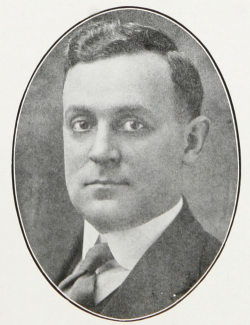Andrew Richard Bliss, Jr.
Andrew Richard Bliss, Jr.
From the History of Kappa Psi By Dewey Garner:
Andrew Richard Bliss, Jr. was born in New York City on November 10, 1889, the son of Andrew Richard Bliss and Frances Revue Sutton Bliss. He received his early education in New York City. Inspired by an innate desire for professional education, he was first attracted to pharmacy and, in 1905, entered the New York College of Pharmacy from which he graduated in 1907 with the degree of Ph.G. Continuing his education, he entered Columbia University, pursuing graduate studies in Chemistry, from which institution he graduated with the degree of Ph.C. in 1908 and Pharm.D. in 1909. He then entered Howard College in Birmingham, Alabama, for academic work and received from that institution the B.Sc. degree in 1910 and the A.M. degree in 1912. He also enrolled in the medical college at the University of Alabama, from which he received the degree of M.D. in 1913. In 1932, Howard College conferred the degree of L.L.D. on him in recognition of his contributions in science and education.
On August 20, 1908, he married Loretta Ann Deering of New York City, a most fortunate wedlock, marked by mutual devotion of this happy couple to the higher ideals of life as manifested by their interest in religion, science, and art. Loretta was a talented writer and poet whose name appeared in Who’s Who Among North American Authors and in American Women. She was well known to pharmacists serving two terms as President of the Memphis, Tennessee Chapter of the National Association of Retail Druggists.
After receiving his doctorate degree in Pharmacy at Columbia, he accepted a position at the University of Alabama as Adjunct Professor of Chemistry and Pharmacology. He advanced to a full professorship of these subjects in the medical, dental, and pharmaceutical schools of that institution and later became Dean of its College of Pharmacy and Professor of Biochemistry in its Graduate School of Medicine. In 1915, he became Chair of Pharmacology in the School of Medicine of Emory University in Atlanta, Georgia where he remained until 1923. He then accepted the position of Chief of the Division of Physiology and Pharmacology in the College of Medicine at the University of Tennessee in Memphis, Tennessee. In 1925 he became Dean of the College of Pharmacy. In 1933 he resigned from the University of Tennessee and became the Head of the Department of Pharmacology and Dean of the School of Pharmacy of Howard College, in Birmingham, Alabama, a position he retained until his death in 1941.
Dr. Bliss served his country during World War I as a Lieutenant in the Medical Department of the United States Army. He was a prolific writer on scientific and educational subjects, more than 100 of which appeared in the pharmaceutical literature and was the author or coauthor of seven text and reference works dealing with chemical, physiological and pharmacological subjects. He was a prominent layman in the Episcopal Church, a Mason, and a member of numerous organizations.
Dick, as he was known by his Brothers, will best be remembered for his long and faithful service to Kappa Psi. His love for the Fraternity knew no bounds. To him, Kappa Psi was almost a religion; he conducted the Office of Secretary-Treasurer as a sacred trust, subordinating personal gain to zeal for the welfare of Kappa Psi. During his administration, Kappa Psi made its greatest progress in extension, owing to his aggressive leadership and personal magnetism. The name “Bliss” became synonymous with Kappa Psi and nearly every brother looked to him for information and direction on matters pertaining to the Fraternity. So concentrated and unflagging was his devotion to his many tasks, that about two years prior to his death he began to show the strain. Despite the advice of his physician and his close friends, it was difficult for him to lessen his activities. He could tolerate no form of relaxation that did not pertain to the Fraternity or to his professional work. In February, 1941, as his health grew worse, he was granted a leave of absence from Howard College, but continued actively to function as Secretary-Treasurer and Editor of The MASK until his death on August 12, 1941.
Dick was initiated into Gamma Chapter of Kappa Psi while an undergraduate student in the New York College of Pharmacy. In 1909 he served as Exchange Editor of The MASK, a position turned over to him by another Gamma initiate, Henry Goeckel. On November 26, 1910 in Birmingham, Alabama, during the fifth session of the Grand Council, Dr. Bliss, Delegate At Large, was nominated by Dr. Marion H. Foster, Delegate At Large, for the Office of Grand Historian and Editor. During the election of Grand Officers which followed no one could have foreseen that Dr. Bliss would continue as Editor of The MASK for 31 consecutive years.
Dr. Richard Bliss served as Grand Historian and Editor from 1910 until 1920. At the 1920 Grand Council Convention the office of Grand Historian became a separate office and the office of Grand Registrar and Editor was established. Dr. Bliss was elected Grand Registrar and Editor and served in that capacity until 1928. At the 1928 Grand Council Convention, the office of Grand Registrar and Editor was abolished and the duties of this office were incorporated with those of the Grand Secretary-Treasurer. Dr. Bliss was elected as the Grand Secretary-Treasurer, the office in which he served until his death on August 12, 1941.
Richard Bliss lived through a significant period of Kappa Psi history. Dr. Bliss was initiated into Kappa Psi in 1905, the year that the Fraternity’s first formal constitution was adopted. The Fraternity consisted of Alpha Chapter, eight collegiate chapters and no graduate chapters. In 1912 he was one of three individuals directed by the Grand Council to investigate the formation of Kappa Psi in the prep schools of New Haven. The report of this investigation is chronicled in the early history section. For many years he devoted considerable time to organizing new collegiate and graduate chapters and he was most successful in this area. At the time of the re-organization of the Fraternity in 1924 the Fraternity consisted of 63 active collegiate chapters and 33 graduate chapters. The re-organization destroyed his dream of a large Kappa Psi fraternity empire. Although he held degrees in both pharmacy and medicine he cast his lot with the pharmacy fraternity where he accepted the office of Grand Secretary-Treasurer. He played a major role in helping to mold a strong pharmacy fraternity and as the principal executive officer he directed many of its essential activities. As Editor he was primarily responsible for recording our historical data for 31 years. His contributions to the success of Kappa Psi were extensive and he left a noteworthy record of loyalty and devotion to Kappa Psi.
The July, 1935 issue of The MASK was dedicated to Dr. Bliss in recognition for his 25 years of continuous service as a member of the Grand Council. Grand Regent, A.O. Mickelsen authorized the members of Gamma Zeta Chapter of Howard College in Birmingham, Alabama, a chapter installed by Dr. Bliss in the College where he served as Dean, to write the issue.
Grand Regent Mickelsen said, “I know of no one who has done more for Kappa Psi than Brother Bliss. He has given generously and continuously of his time, energy and personal funds, and Kappa Psi honors itself, as well as Dr. Bliss, in dedicating this number to him. We felt it was most fitting and appropriate to make this number a "Bliss Number” by running a biography of Dr. Bliss.” The biography was written by Dr. P.B. Waddell who was associated with him as a member of his staff for a period of twelve years. Dr. Bliss was completely unaware of the preparation and nature of this number of The MASK. Through the cooperation of the publishers, the copy for the July issue compiled by Dr. Bliss was secretly replaced by the copy for this dedicatory issue, and his July copy became the copy for the January, 1936 issue.
Dr. Richard Bliss died at his place of residence, an apartment/suite at the Hotel Tutwiler in Birmingham, Alabama at 11:15 P.M. on August 12,1941. The Death Certificate listed cause of death as: chronic myocarditis, chronic nephritis, and high blood pressure. Services were held on August 14 at the Church of the Advent in Birmingham, Alabama and on August 16 at Dr. Bliss’ family home, 270 Stuyvesant Avenue, Brooklyn, New York. Interment was in the family plot in Cypress Hills Cemetery in New York City, New York. He was survived by his wife, Loretta Ann. Thus, passed on, at the untimely age of 51, an inspiring leader in Pharmacy and a most faithful brother of Kappa Psi.

